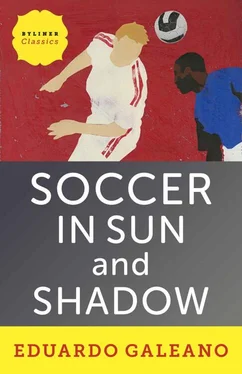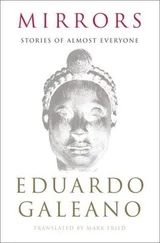Everyone knows it is bad luck to step on a toad or on the shadow of a tree, to walk under a ladder, to sit or sleep backward, to open an umbrella indoors, to count your teeth, or break a mirror. But in soccer that barely scratches the surface.
Carlos Bilardo, coach of the Argentine team for the World Cups in 1986 and 1990, did not let his players eat chicken because it would give them bad luck. He made them eat beef, which gave them uric acid instead.
Silvio Berlusconi, owner of Milan, forbade fans from singing the club’s anthem, the traditional chant “Milan, Milan,” because its malevolent vibrations paralyzed his players’ legs; in 1987 he commissioned a new anthem, “Milan Nei Nostri Cuori.”
Freddy Rincón, Colombia’s black giant, disappointed his many admirers at the ’94 World Cup. He played without a drop of enthusiasm. Afterward we learned that it wasn’t from a lack of desire, but an excess of fear. A prophet from Buenaventura, Rincón’s home on the Colombian coast, had foretold the results of the championship, which turned out exactly as predicted, and warned that he would break his leg if he was not very careful. “Watch out for the girl with freckles,” he said, referring to the ball, “and for the one with hepatitis, and the one covered in blood,” alluding to the yellow and red cards of the referee.
On the eve of that Cup’s final, Italian specialists in the occult declared their country would win. “Numerous evil spirits from black magic will defeat Brazil,” the Italian Magicians Association assured the press. The contrary result did not add to the prestige of the profession.
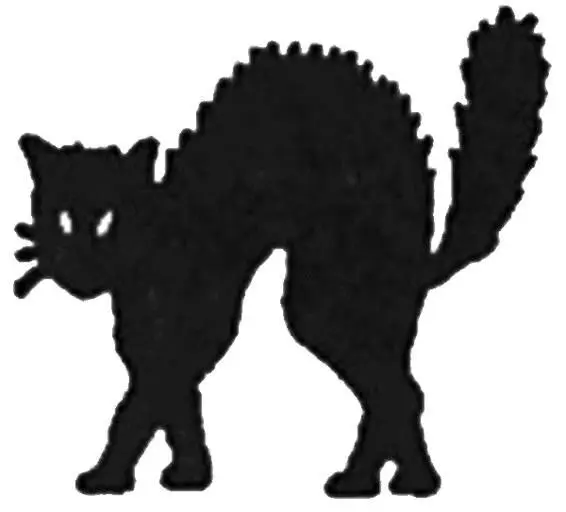
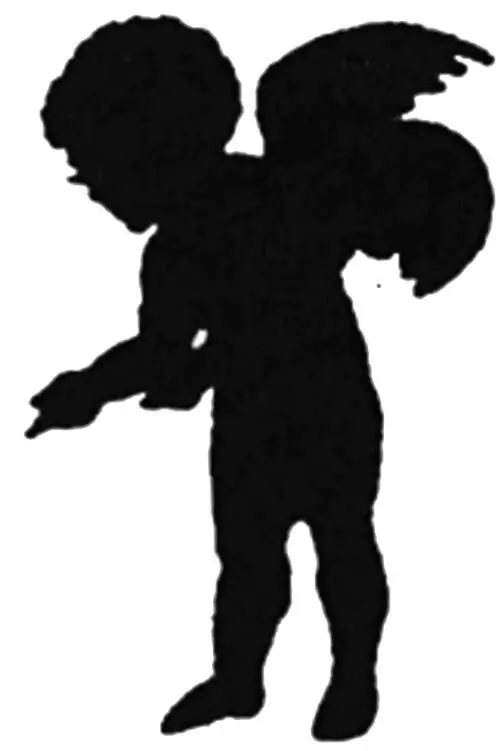
Many players put their right foot first and cross themselves when they step onto the field. Some go directly to the empty goal and kick one in or kiss the posts. Others touch the grass and bring their fingers to their lips.
Often you see a player wearing a little medal around his neck or a magic band tied around his wrist. If his penalty kick goes awry, it’s because someone spat on the ball. If he misses an easy shot, it’s because some witch closed the enemy goal. If he loses the match, it’s because he gave away his shirt after the last victory.
Amadeo Carrizo, goalkeeper for the Argentine club River Plate, went eight matches with his net untouched thanks to the powers of a cap he wore day and night. That cap exorcised the demons of the goal. One afternoon Ángel Clemente Rojas, a player for Boca Juniors, stole it. Without his amulet, Carrizo let two goals by and River lost the match.
A leading Spanish player, Pablo Hernández Coronado, says that when Real Madrid refurbished its stadium the team went six years without winning a championship, until a fan broke the curse by burying a head of garlic in the center of the playing field. Barcelona’s celebrated forward Luis Suárez did not believe in curses, but he knew that every time he knocked over a glass of wine while eating he was going to score a few goals.
To invoke the evil spirits of defeat, fans throw salt on the enemy’s field. To scare them off, they sow their own field with fistfuls of wheat or rice. Others light candles, offer the earth cane liquor, or toss flowers into the sea. Some fans seek protection by praying to Jesus of Nazareth and the blessed souls who died by fire, drowning, or losing their way. In several places Saint George’s lances and those of his African twin Ogum have proved very effective against the dragon of the evil eye.
Thoughtful gestures are appreciated. Fans favored by the gods crawl on their knees up steep slopes, wrapped in the team flag, or they spend the rest of their days whispering the million rosaries they swore to say. When Botafogo was crowned champion in 1957, Didi left the field without going to the dressing room and, still in his uniform, fulfilled the promise he had made to his patron saint: he walked across the city of Rio de Janeiro from end to end.
But deities do not always have time to come to the aid of soccer players tormented by misfortune. The Mexican team arrived at the 1930 World Cup overwhelmed by pessimistic predictions. Just before the match against France, Mexican coach Juan Luque de Serrallonga gave the players a pep talk at his hotel in Montevideo. He assured them that the Virgin of Guadalupe was praying for them back home on Tepeyac Hill.
The coach was not apprised of the Virgin’s busy schedule. France scored four goals and Mexico finished in last place.
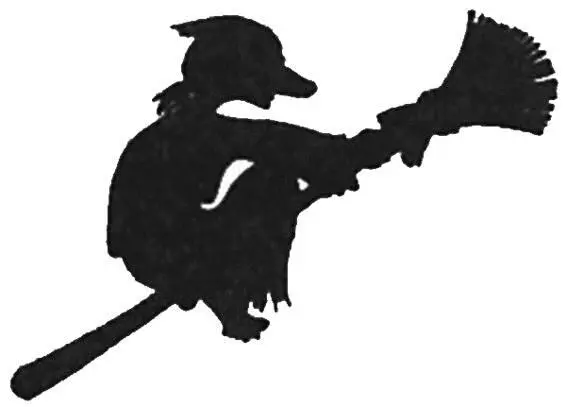
During the Chaco War, while the peasants of Bolivia and Paraguay were marching to the slaughter, Paraguay’s soccer players were in other countries playing to raise money for the many who fell helplessly wounded in a desert where no birds sang and people left no footprints. That’s how Arsenio Erico came to Buenos Aires, and in Buenos Aires he stayed. Argentina’s leading scorer of all time was Paraguayan. Erico scored over forty goals a season.
That magician had secret springs hidden in his body. He could jump without bending his knees, and his head always reached higher than the goalkeeper’s hands. The more relaxed his legs seemed, the more powerfully they would explode to lash out at the goal. Often Erico would whip it in with his heel. There was no deadlier backheel in the history of soccer.
When Erico wasn’t scoring goals, he was offering them on a platter to his teammates. Cátulo Castillo dedicated a tango to him:
Your pass from the heel or head is such
a marvelous feat
a thousand years won’t see a repeat.
And he did it with the elegance of a dancer. “He’s Nijinski,” commented the French writer Paul Morand, when he saw him play.
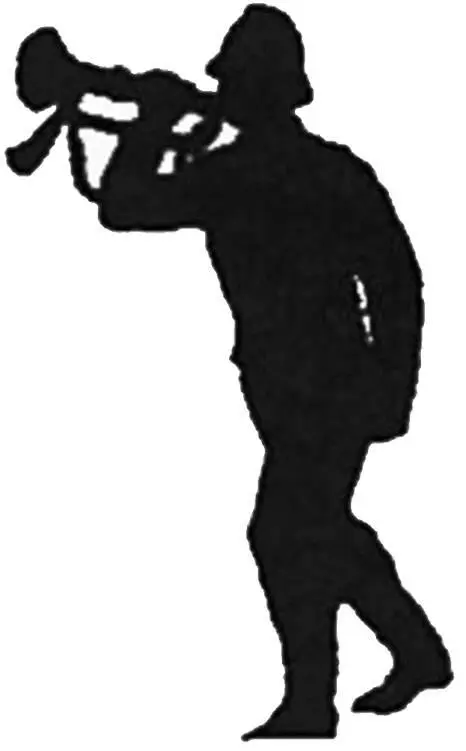
Max Theiler was discovering a vaccine for yellow fever, color photography was being born, Walt Disney was launching Snow White, and Eisenstein was filming Alexander Nevsk y. Nylon, invented not long before by a Harvard professor, was being turned into parachutes and ladies’ stockings.
The Argentine poets Alfonsina Storni and Leopoldo Lugones were killing themselves. Lázaro Cárdenas was nationalizing Mexico’s oil and confronting a blockade and other Western furies. Orson Welles was broadcasting a Martian invasion of the United States to frighten the gullible, while Standard Oil was demanding a real invasion of Mexico to punish the heresy of Cárdenas and put an end to his bad example.
In Italy Manifesto on Race was being written and anti-Semitic attacks were on the rise. Germany was occupying Austria; Hitler was hunting down Jews and devouring territory. The English government was ordering people to stockpile food and teaching them to defend themselves against poison gas. Franco was cornering the last bastions of the Spanish Republic and receiving the recognition of the Vatican. César Vallejo was dying in Paris, probably in the pouring rain, while Sartre was publishing Nausea . And there, in Paris, under the darkening shadows of the war to come, where Picasso’s Guernica was on display to denounce the time of infamy, the third World Cup was getting under way. In Colombes stadium, French president Albert Lebrun made the ceremonial kickoff: he aimed at the ball, but cuffed the ground.
Читать дальше
